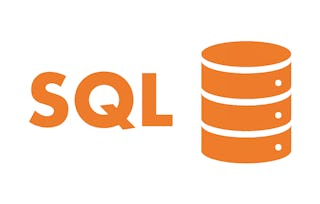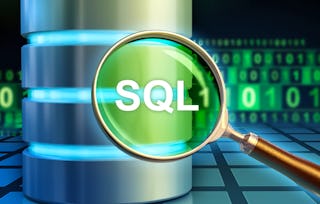In this course, you will be introduced to databases and explore the modern ways in which they are used. Learn to distinguish between different types of database management systems then practice basic creation and data selection with the use of Structured Query Language (SQL) commands.

Introduction to Databases

Introduction to Databases
This course is part of Meta Database Engineer Professional Certificate

Instructor: Taught by Meta Experts
105,456 already enrolled
Included with
1,441 reviews
Recommended experience
What you'll learn
Concepts and principles that underpin how databases work .
Plan and execute a simple database development project .
Skills you'll gain
Details to know

Add to your LinkedIn profile
24 assignments
See how employees at top companies are mastering in-demand skills

Build your Data Management expertise
- Learn new concepts from industry experts
- Gain a foundational understanding of a subject or tool
- Develop job-relevant skills with hands-on projects
- Earn a shareable career certificate from Meta

There are 5 modules in this course
In this module, you’ll receive an introduction to the course and explore possible career roles that you could follow as a database engineer. You’ll also review some tips on how to take this course successfully and discuss what it is that you hope to learn. As part of your introduction, you’ll learn about the basics of databases and data and how they work. You’ll then receive an introduction to SQL, or Standard Query Language, the coding syntax used to interact with databases. Finally, you’ll explore the basic structure of databases and discover the different types of keys they use.
What's included
13 videos10 readings4 assignments
In this module, you’ll explore CRUD, or Create, Read Update and Delete operations. You’ll begin with an exploration of SQL data types and learn how to differentiate between numeric data, string data and default values. You’ll also embark upon several exercises in which you’ll learn how to utilize these different data types within your database projects. You’ll then move on to learn how to Create and Read data within a database. You’ll discover how to create databases and tables and populate them with data using SQL statements. Lastly, you’ll explore the SQL statements used for updating and deleting data in a database. And to demonstrate your ability with CRUD operations, you’ll complete exercises that will task you with creating and managing data.
What's included
12 videos4 readings10 assignments7 ungraded labs
In this module, you’ll explore SQL operators and learn how to sort and filter data. You’ll begin this module with a lesson on SQL operators. As part of this first lesson, you’ll explore the syntax and process steps used to deploy SQL arithmetic and comparison operators within a database. Next, you’ll discover how to sort and filter data using clauses. The clauses that you’ll learn about include the Order By clause, Where clause and Select Distinct clause. In each lesson item, you’ll receive an overview of how each clause is used to sort and filter data in a database. You’ll also view demonstrations of these clauses and then receive an opportunity to try them for yourself.
What's included
7 videos7 readings3 assignments1 ungraded lab
In this module, you’ll learn about database design. In the first lesson, you’ll receive an overview of how to design a database schema. As part of this overview, you’ll learn about basic database design concepts like schema and find out about different types of schemas. The next lesson focuses on relational database design. In this lesson, you’ll explore how to establish relationships between tables in a database using keys. You’ll also learn about the different types of keys that are used in relational database design, such as primary keys and foreign keys.
What's included
12 videos9 readings6 assignments1 ungraded lab
In this module, you’ll have an opportunity to recap what you learned and identify your strengths as well as target topics that you would like to revisit in this course.
What's included
2 videos2 readings1 assignment1 discussion prompt
Earn a career certificate
Add this credential to your LinkedIn profile, resume, or CV. Share it on social media and in your performance review.
Instructor

Offered by
Explore more from Data Management
 Status: Free Trial
Status: Free TrialBoard Infinity
 Status: Free Trial
Status: Free Trial Status: Preview
Status: PreviewUniversitat Politècnica de València
 Status: Free Trial
Status: Free Trial
Why people choose Coursera for their career

Felipe M.

Jennifer J.

Larry W.

Chaitanya A.
Learner reviews
- 5 stars
78.14%
- 4 stars
18.45%
- 3 stars
2.01%
- 2 stars
0.55%
- 1 star
0.83%
Showing 3 of 1441
Reviewed on Feb 10, 2023
Great introduction! Everything is so well put together and the explanations are very clear.
Reviewed on Feb 22, 2024
Course is very well structured and Instructor's Explanations are easy to understand and are very concrete and concise. Great Course for beginners.
Reviewed on Sep 1, 2022
Well detailed course, I thought this topic was going to be hard to learn. But the teacher explained it well. Anyway, I enjoy this course, because I learned a lot from it. Thank you Coursera and Meta.

Open new doors with Coursera Plus
Unlimited access to 10,000+ world-class courses, hands-on projects, and job-ready certificate programs - all included in your subscription
Advance your career with an online degree
Earn a degree from world-class universities - 100% online
Join over 3,400 global companies that choose Coursera for Business
Upskill your employees to excel in the digital economy
Frequently asked questions
To access the course materials, assignments and to earn a Certificate, you will need to purchase the Certificate experience when you enroll in a course. You can try a Free Trial instead, or apply for Financial Aid. The course may offer 'Full Course, No Certificate' instead. This option lets you see all course materials, submit required assessments, and get a final grade. This also means that you will not be able to purchase a Certificate experience.
When you enroll in the course, you get access to all of the courses in the Certificate, and you earn a certificate when you complete the work. Your electronic Certificate will be added to your Accomplishments page - from there, you can print your Certificate or add it to your LinkedIn profile.
More questions
Financial aid available,

